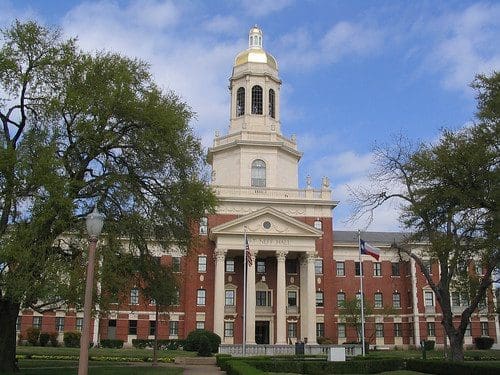IIn the wake of the Chinese coronavirus pandemic, virtually every individual, family, and company is scrutinizing their budget and cutting back where they can. Private universities are no exception.
On Tuesday, Baylor University announced plans to trim $65-80 million from its budget in the fiscal year that begins June 1, and on Wednesday, St. Edward’s University in Austin revealed plans to cut six athletic programs as part of a downsizing exercise. They’re both private universities, but the University of Texas, Texas A&M, Texas Tech, and their other taxpayer-funded cohorts need to follow their lead.
In an email to faculty and staff, Baylor University President Linda Livingstone said that even if the Chinese coronavirus pandemic fails to be as devastating in terms of loss of life, the economic damage already wrought by shutdown orders and drops in demand necessitates a discerning review of the university’s finances.
Livingstone writes the university has already made cuts of $16 million but will need to do more:
“Even if we see progress in the decreases in cases or deaths related to the coronavirus, both the short- and long-term financial prognoses for the economy – and specifically higher education – appear challenging. Despite Baylor’s overall strength and resilience, we are now experiencing declines in many essential sources of revenue, which is coupled with an increased need for student financial aid and uncertainty about future enrollment due to COVID-19. In other words, most of our previously reliable sources of revenue – tuition and fees, fundraising, athletics and income from our investments and endowment – are certain to be significantly affected.
“On March 25, the President’s Council and I asked the University community to help us conserve our current financial resources and slow the rate of spending through the end of Fiscal Year 2019-20. We sincerely appreciate how you aggressively answered this call by helping the University reduce costs by $16 million through May 31, which will allow us to address the credits and refunds provided for our students’ interrupted spring semester and many other unplanned costs related to COVID-19. For these sacrificial efforts, we thank you.
“Now is the time for us to focus on the upcoming fiscal year, which begins June 1, to ensure that when Baylor emerges from this global crisis, we will be differentially ahead and continue moving toward Tier 1/Research 1 status as the preeminent Christian research university. Simply put, we need to make immediate and difficult decisions to address the serious financial realities we face in the months and, potentially, years ahead.
“The President’s Council – with counsel and support of the Baylor University Board of Regents – has carefully and prayerfully evaluated several revenue models and financial plans over the past two weeks to establish a goal of $65 million to $80 million in cost reductions from our projected $750 million budget University-wide for FY20-21, much of which is tied to compensation, utilities and other contractually binding obligations. We recognize these budget cuts will be difficult and will touch every aspect of the University, including academics, administration, operations and support services, and athletics.”
Livingstone goes on to outline a review of cost-saving measures including staving off merit pay increases for staff, reducing the university’s contribution to staff retirement accounts, implementing a hiring freeze, and initiating strategic reviews of all programs and spending.
Those decisions make sense for Baylor, and indeed for any public university given the budget crunches already materializing for Texas families and government. However, they’ve yet to be echoed by any of the state’s public university presidents, deans, and chancellors.
The Gov. Greg Abbott-appointed regents who oversee them should demand they do so.





